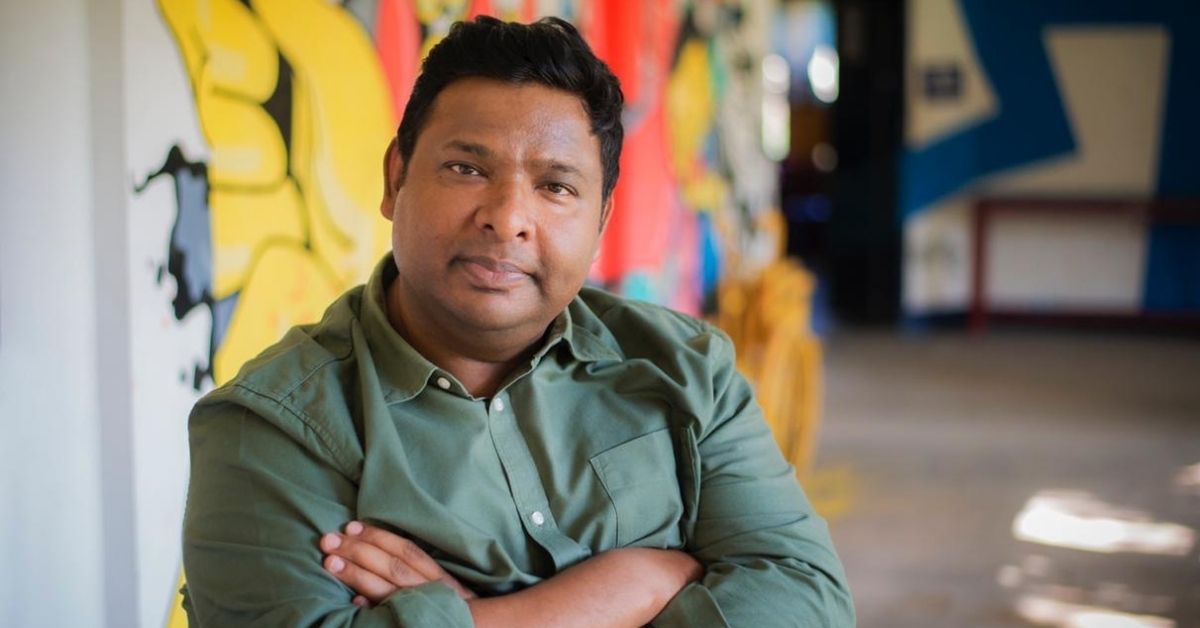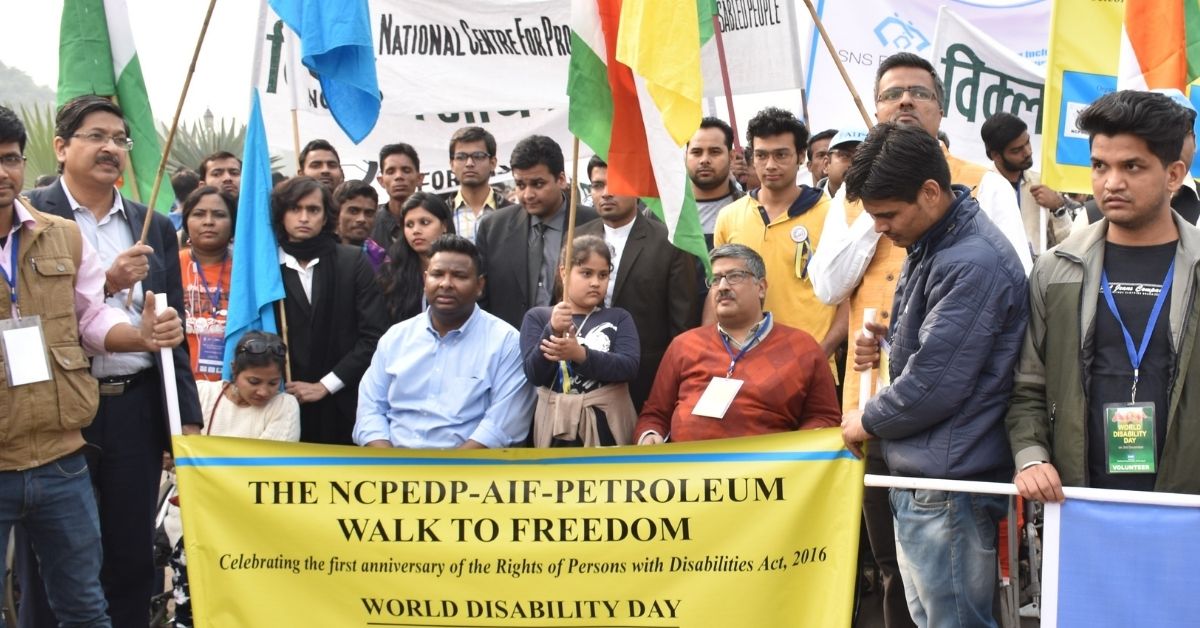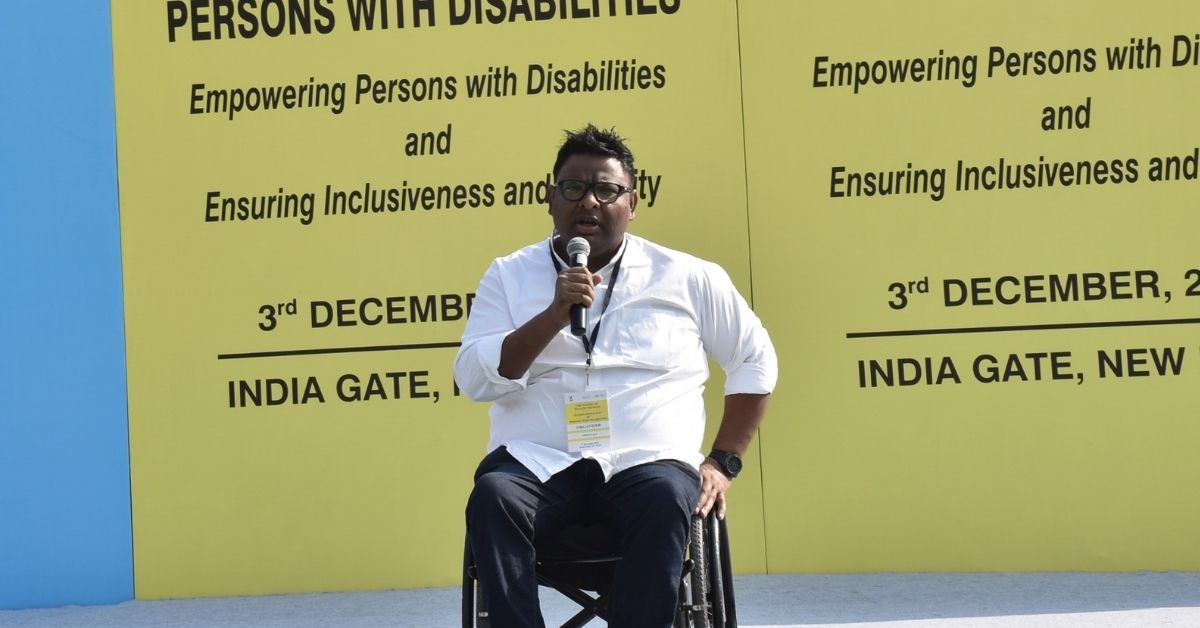Arman Ali was advised to start going to the gym to maintain his health in 2011. He chose a centre in Guwahati under the impression that he could access it independently in a wheelchair without additional assistance. When he visited the gym for the first time, he was met with passive resistance. First, there was a 30-minute wait period, and then he was asked to get a doctor’s certificate to prove he was fit to join. Then, he was asked to obtain a certificate from an orthopedic surgeon.
But he was accused of submitting fake certificates and the gym insisted on speaking to the doctor directly. The doctor gave Arman the all-clear. However, Arman never received his membership.
One day, he showed up at the gym, and the instructors put him through 30 minutes of rigorous and non-stop weight training. Arman could do most of the workout and thought the gym would now cooperate. But they didn’t. And so this ordeal went on for four months, where Arman continued to be denied membership due to his disability. At the end of the four months, the gym offered him one month’s conditional membership at rates worth a full year.
So Arman moved the Guwahati High Court, back when there was no Rights of Persons With Disabilities Act in India. Eventually, the court directed the high-end gym and the Assam government to pay a penalty of Rs 50,000 each to the city-based NGO that Arman runs.
This was one of the first few incidents in which a private company was held accountable for disability discrimination.
Arman, who is a 40-year-old disability rights activist from Assam and the executive director of the National Centre for Promotion of Employment for Disabled People (NCPEDP), has faced many such incidents. As a wheelchair user with cerebral palsy, he has seen many roadblocks but has used them to work for adequate rights for persons with disabilities (PwDs).
Working with NCPEDP, Arman fights for the rights of 70 million PwDs. Alongside, he also helped draft India’s Rights of Persons with Disabilities Act, 2016. In a conversation with The Better India, he highlights his journey with cerebral palsy, his work with NCPEDP, the challenges he has faced along the way, and what India’s disability act entails.

‘A citizen of the country with Constitutional rights’
“I was born in a large family with five siblings and had a normal childhood. While I had cerebral palsy, my parents never let me feel inferior about my disability. My father ensured I had access to all the things my brothers enjoyed, whether it was sports, recreation or education,” he tells The Better India.
“While the school I went to was very good, they had an inaccessible toilet where I had to climb five to six steps to get there. This was difficult for me, and at times, I ended up urinating in my pants. After a few weeks, the principal asked my father to have me withdrawn from the school permanently,” he recalls.
Arman was subsequently put in other schools, but in Class 8, his health began deteriorating and he underwent leg surgery. Due to a six-month recovery period at home, he was expelled from his new school. “So while my brothers continued their education, I remained at home. It was an extremely demoralising experience for me. I used to just eat, sleep and play games, but I wanted to study and create opportunities for myself. At that time, I never thought I had any kind of disability, but a disease from which my legs can be cured. It took me a while to realise that I have a disability and that it’s normal, it’s who I am,” he notes.
After completing his education through distance learning, Arman was armed with the drive to overcome social stigma and the challenges that PwDs routinely face. Before joining NCPEDP, he worked with Shishu Sarothi Centre for Rehabilitation and Training for Multiple Disability, and with Infosys in Bengaluru where he headed their Equal Opportunity Initiative. He says his true induction in India’s disability movement happened back in 1998 when he met Javed Abidi, India’s leading disability rights activist and founder of NCPEDP.
“I met Javed bhai for the first time when I was only 18. I was in New Delhi to receive the National Award (MSJE) for Outstanding Performance as the Most Efficient Disabled Employee for the Year 1998 conferred by the then PM, Mr Atal Bihari Vajpayee, and I attended a national convention organised by NCPEDP around the same time. I was based in Guwahati then and had minimal exposure to disability rights,” he recalls.
“Within the first meeting itself, I understood how much one could learn from him by simply observing. His influence on me has been that of a teacher and mentor. He taught you how to look at disability from a different perspective — in terms of budget, education, census, elections, employment, accessibility, and more. His perspective was — how does a PwD envision themselves a citizen of the country with certain constitutional rights? I miss him a lot, and it was his untimely demise that made me move to Delhi and take over his responsibility as Executive Director of the organisation,” Arman says.
NCPEDP is India’s leading cross-disability organisation which works for policy advocacy for rights of PwDs. The organisation has pioneered many disability rights movements in India, including the passage of India’s first disability act in 1995, the inclusion of disability in the 2001 and 2011 census, speedy ratification of UN Convention on the Rights of Persons with Disabilities by India, and the final drafting of the 2016 disability rights legislation.

After Abidi died in 2018, Arman took over as Executive Director. “The last two and a half years of our persistent lobbying with the government has led to sea changes,” Arman says. “A majority of our recommendations on the draft of the National Education Policy were part of the final NEP published in July last year. We are working with the government on making ICT accessible to people with disabilities. We are also working with the election commission to make elections accessible via alternative voting methods for PwDs including early voting, voting from home, postal vote, etc. We have also launched the NCPEDP-Javed Abidi Fellowship on Disability with the support of Azim Premji Foundation (The Philanthropy). It is a three-year immersive programme that will allow 25 youth with disabilities to delve into and voice issues faced by PwDs at the grassroots.”
The long road ahead
While working with Abidi, Arman led consultations with government and civil societies in all the seven states in the Northeast. At this time, it was NCPEDP that began the discourse around the need for a new law for PwDs. The previous act of 1995 was not in harmony with the UNCRPD and required several amendments. “NCPEDP was working to draft new clauses and amendments, and I was part of that. So this ran parallelly with the laws that the government was working on at the time, as our role was to highlight the voices of PwDs and what they wanted,” Arman says. In particular, he coordinated the contributions of the entirety of the Northeast.
When the Bill was not passed in the Rajya Sabha, Arman stood alongside Abidi to protest and it was finally passed in 2016. “The Act, for the first time, held the private sector accountable to be accessible for PwDs. It called for equal opportunities for PwDs in any organisation with more than 20 employees. It made the public humiliation or discrimination of PwDs a punishable act,” he explains.
However, he notes, “Ideally, the rights enshrined in the Constitution to protect PwDs should be enough, but in practice, the community remains marginalised, excluded and isolated. Any law remains just another piece of paper unless implemented in true letter and spirit, and serving those for whom it has been enacted.”

Speaking about the challenges he has faced over the years, Arman says, “Making governments aware that disability is a development and human rights issue and not one of charity has always been the biggest challenge. Disability is not on the agenda during decision-making processes and remains an afterthought. This has been especially true amid the pandemic.”
PwDs are among the worst hit during COVID-19, in terms of the struggle for food, healthcare, education, livelihood opportunities and other such crucial needs. NCPEDP has launched various COVID-19 helplines to provide support to PwDs and wrote to the Prime Minister with a list of important demands. “Priority has to be given to PwDs for vaccination. We also are in conversation with the Disaster Management authorities to make their work disability-inclusive,” Arman explains.
In 2017, Arman put out a post in which he detailed how he was called a Pakistani because he couldn’t stand for the national anthem in a movie theatre. In 2019, while hailing an Uber in Chennai, he was subject to discrimination by the driver who refused to accommodate Arman’s wheelchair during the ride. Arman was then unceremoniously pushed out of the cab. The Delhi Commissioner for Persons with Disabilities issued an order asking Uber to compensate him with 80% locomotor disability after two cab drivers refused to ferry him and board his wheelchair, leading to him miss his flight. “It was appalling to see how even after the RPWD 2016 has been passed, there is so much discrimination against PwDs at every level,” Arman says.
Arman is also an avid shooter and won the gold medal in the 4th and 5th North East Zone Shooting Championship held in 2016 and 2017, besides accolades by the National Rifle Association of India. For his works as a disability rights activist, he has won several awards, including the Literacy Hero Award 2016 for exemplary work in ensuring better education for children with disabilities.
However, he recognises that when it comes to tackling the issues faced by PwDs, there is a long road ahead. “There is an acute lack of awareness about PwDs in India. We are somehow invisible and no one seems to mind it. Why are we ignoring the elephant in the room? India has the largest population of PwDs in the world and a new India cannot exist without incorporating them as equal citizens. Disability is a political issue that we must address at all levels, from planning to execution. We need a life-span approach to disability,” Arman notes.
Edited by Yoshita Rao
No comments:
Post a Comment